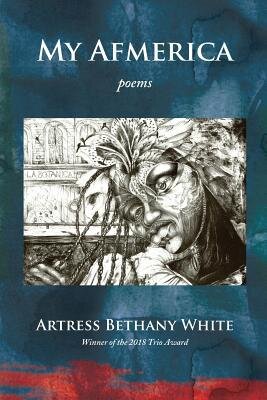My Afmerica by Artress Bethany White, Reviewed by Editor Alley L. Biniarz
Artress Bethany White’s recent collection of poetry is both timely and timeless—the questions she asks American citizens can be applied to all Westernized countries. My Afmerica, winner of the 2018 Trio Award for First or Second Book for emerging poets, is a survival narrative that envelops the duality of the African American experience in the U.S. and the struggle for the American dream.
Right from the get-go, White questions how we’ve been able to remain comfortable with the underlying atrocities that crawl beneath the skin of the U.S. From weddings taking place at old plantations, white-washed traditions, and stolen antiques living in an “American” museum, White brings to our attention how much of this “great nation” was built on the backs of slaves. Her words gently slide across our cheeks with lyricism and then trap our gaze with melodic beats—she doesn’t let us turn away.
White meanders through her verses with simple structure, so that when she plays with forms like dictionary definitions, song titles, and media releases, we think past physical layouts and dive into her storytelling. White leaves room to the imagination, for the reader to go deeper and ask: in a world where we have infinite access to information, why are there still hidden truths left to discover?
White steers our ship through her Afmerica and doesn’t hesitate to take us through choppy waters and smooth sailing alike. As she says in “Tripping with Dad (vi),” “chanting what better home could we find […]/ rites we, a sea people, could understand” (59). She flows through waves of the past and introduces us to modern family dynamics, exploring how trauma flows through bloodlines. White also brings to attention how her family has made a home from their prison, and yet, some still deny their right to existence in the country. The sentiment is strong in “An American Moor in Spain,” which states, “I am stolen goods/but can trace my family back/ three hundred years on U.S. soil,/longer than Whitman’s leaves of grass” (12).
With one look at White’s skin, someone could erroneously claim that she doesn’t belong in the U.S. In “An American Moor in Spain,” she addresses this claim by questioning, “How to navigate this moment/ when a child professes to know/ more than me about who I am.” (11). As White dissects these themes of home, family, and identity, it’s clear that she views herself as American; however, she questions how she can consciously choose her home while others are simultaneously trying to choose it for her.
Having experienced a lifetime of others trying to define her, and questioning her belonging, White says it best in her title: My Afmerica. These are her truths to define through her collection, one that should be read by anyone who has been made to believe that they don’t have a place in their home. My Afmerica is for those working towards the impossible “American Dream”—a dream that has been unequal from the very start.
November 11, 2019
Alley L. Biniarz
Alley L. Biniarz is a first-generation Polish-Canadian writer with an MFA in Creative Nonfiction from the University of King’s College. She also holds degrees in English and French Literature, and Journalism. She is an environmentalist, a feature writer, essayist, and slam poet. In her writing, she explores the themes of consent, ecofeminism, religious upbringing, European superstitions, belonging, and love – always love. Find her on Instagram: @abeaans.



